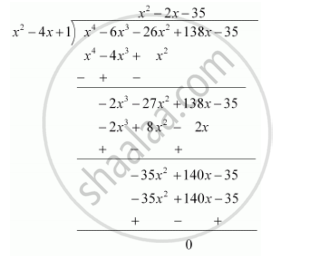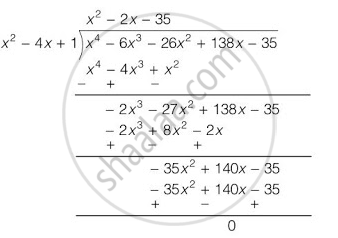Advertisements
Advertisements
Question
If two zeroes of the polynomial x4 – 6x3 – 26x2 + 138x – 35 are 2 ± `sqrt3` , find other zeroes
Solution 1
Given that 2 + `sqrt3` and 2 - `sqrt3` are zeroes of the given polynomial
Therefore, `(x - 2-sqrt3)(x-2+sqrt3)` = x2 + 4 - 4x - 3
= x2 - 4x + 1 is a factor of the given polynomial
For finding the remaining zeroes of the given polynomial, we will find the quotient by dividing by x4 - 6x3 - 26x2 + 138x - 35 by x2 - 4x + 1

Clearly x4 - 6x3 - 26x2 + 138x - 35 = (x2 - 4x +1)(x2 -2x -35)
It can be observed that (x2 - 2x - 35) is also a factor of the given polynomial.
And (x2 - 2x - 35) = (x -7)(x + 5)
Therefore, the value of the polynomial is also zero when x - 7 = 0 or x + 5 = 0
or x = 7 or -5
Hence, 7 and - 5 are also zeroes of this polynomial
Solution 2
2+√3 and 2-√3 are two zeroes of the polynomial p(x) = x4 – 6x3 – 26x2 + 138x – 35.
Let x = 2±√3
So, x-2 = ±√3
On squaring, we get x2 - 4x + 4 = 3,

= (x2 - 4x + 1) (x2 - 2x - 35)
= (x2 - 4x + 1) (x2 - 7x + 5x - 35)
= (x2 - 4x + 1) [x(x - 7) + 5 (x - 7)]
= (x2 - 4x + 1) (x + 5) (x - 7)
∴ (x + 5) and (x - 7) are other factors of p(x).
∴ - 5 and 7 are other zeroes of the given polynomial.
APPEARS IN
RELATED QUESTIONS
Find the zeros of the quadratic polynomial 6x2 - 13x + 6 and verify the relation between the zero and its coefficients.
If 𝛼 and 𝛽 are the zeros of the quadratic polynomial f(t) = t2 − 4t + 3, find the value of `alpha^4beta^3+alpha^3beta^4`
If the squared difference of the zeros of the quadratic polynomial f(x) = x2 + px + 45 is equal to 144, find the value of p.
Find the zeroes of the quadratic polynomial `4x^2 - 4x + 1` and verify the relation between the zeroes and the coefficients.
Find the quadratic polynomial, sum of whose zeroes is `( 5/2 )` and their product is 1. Hence, find the zeroes of the polynomial.
Find a cubic polynomial whose zeroes are `1/2, 1 and -3.`
Find a cubic polynomial with the sum of its zeroes, sum of the products of its zeroes taken two at a time and the product of its zeroes as 5, -2 and -24 respectively.
If two of the zeros of the cubic polynomial ax3 + bx2 + cx + d are each equal to zero, then the third zero is
The product of the zeros of x3 + 4x2 + x − 6 is
If two of the zeroes of a cubic polynomial are zero, then it does not have linear and constant terms.
